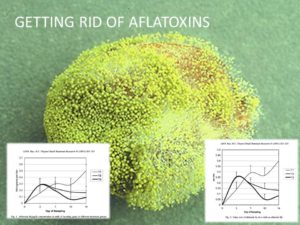While doing some research recently a collaborator asked if biochar fed to dairy cows impacts the quality of milk. Given that the purpose of adding biochar to livestock feed is to bind toxins and other nasties, it seemed logical but as I sought an answer to the question, the research on this particular question seemed scarce. However I did find a few tantalizing bits of research which showed how much healthier goat and dairy milk was when goats and cows were fed charcoal. But before I get to the good news, let me tell you about a not so fun guy (or fungi) that can often be found lurking in different animal products.
Aflatoxins: not a word that is commonly bandied about outside of academia, but aflatoxins can have a major impact on crops and critters, including us! Aflatoxins are naturally occurring products brought to us by fungi. They can be generated in soils or silos when too much water is left on crops. They are most commonly found on corn and cottonseed, but may also be found on soybean and distillers grain. When eaten by livestock a certain amount of it can carry over into eggs, milk and meat. When consumed by humans, high or long term exposure can lead to all sorts of health issues from convulsions to cancer. In the US alone, the economic impact of aflatoxins on the dairy industry is estimated to exceed $200M per year!
And now to the good news. The goat research out of India showed that supplementing charcoal in the daily diet of dairy goats (1% DM), significantly reduced the amount of aflatoxins that showed up in their milk without any reduction in milk quantity or nutrient quality – with the exception of Zinc which increased. The two charts in the above graphic show just how much aflatoxin levels can be reduced (T1 is control; T2 is sodium bentonite and T3 is charcoal). The control milk had nearly five times as much aflatoxin as compared to the milk from the char chomping goats! The dairy research done in Italy showed that certain types of activated charcoal could reduce aflatoxin carry over in milk by up to 50%, an improvement of other common binders which topped out at 36%.
Unfortunately in the U.S. the use of plant derived charcoal is not currently permitted as a feed additive for livestock that are expected to enter the human food chain (i.e. its ok for cats but not cows!). In 2012 the Association of Animal Feed Control removed charcoal from their approved list of feed additives citing concerns of possible chemical or heavy metal contamination. Thankfully researchers and biochar producers are working closely with the Food & Drug Administration to demonstrate that feeding biochar to livestock is not only safe, but highly beneficial. Researchers and producers in Germany have also been working with regulators quite successfully to demonstrate the multiple health and economic benefits of feeding char to hogs, hens and Holsteins!


